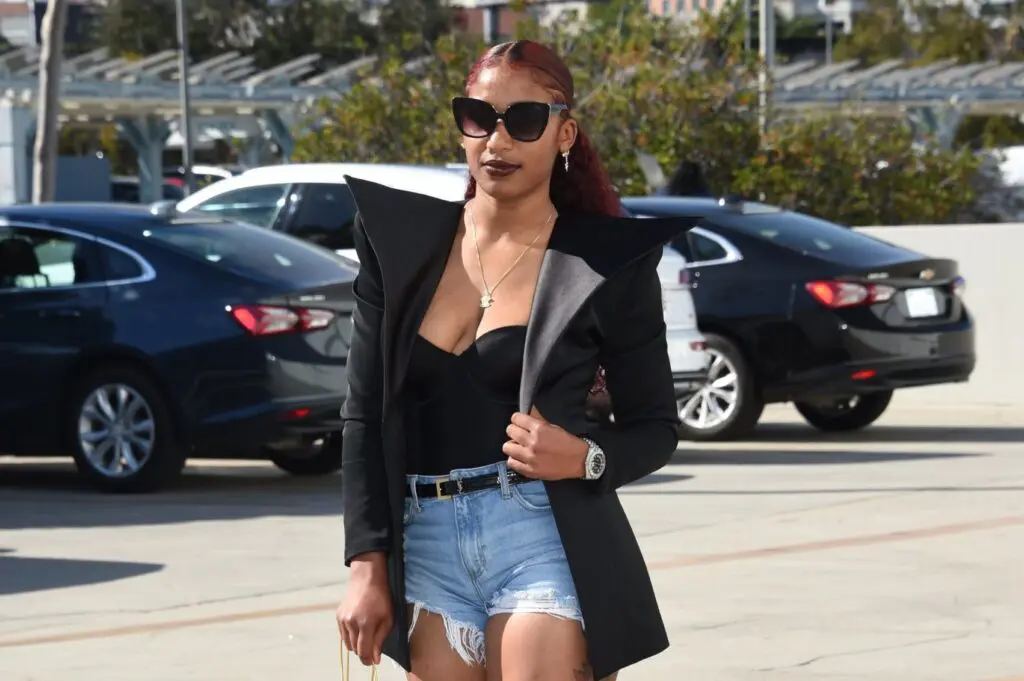The intersection of fashion and sports gives athletes room to carve out their own identity, serving as a cultural arena that connects women’s sports to the mainstream.
No professional women’s sports league has exemplified that truth more than the WNBA. Since 2018, social media accounts like MadeForTheW and LeagueFits have highlighted the lifestyle and fashion choices of today’s biggest WNBA and NBA stars, bringing the sports culture into everyday conversation.
As interest in the WNBA continues to grow, so does the spotlight on players in the league, who are rapidly emerging as style influencers.
“A trendsetter is someone who is able to influence others based on their own unique style,” says Chicago Sky guard Diamond Deshields. “Trendsetters are leaders and individuals who stretch the boundaries of what fashion is. Trendsetters are risk-takers.”
Players such as Brittney Griner, Cappie Pondexter, Skylar Diggins-Smith, Sue Bird and Tamera “Ty” Young have solidified their place among the most fashionable athletes in the 25-year history of the league. And behind them, a new wave of WNBA athletes who use fashion as a vehicle to drive cultural change is on the rise.
Diggins-Smith became one of the most marketable female athletes in the country during her collegiate career from 2009-13, leading Notre Dame to three consecutive Final Fours and two straight championship appearances. In that time, she redefined the meaning of on-court swag through the spark of the #HeadbandNation movement.
From middle schoolers to professional athletes, fans everywhere mimicked Diggins-Smith’s on-court look. The popularity it generated even led to Diggins-Smith receiving her own headband line.
“I don’t think people will really appreciate it [maybe until I retire], but I definitely know what I brought to the table as far as culture,” the Phoenix Mercury guard said on the “Kickin’ It with Khristina” podcast. “You know, the whole social media craze was starting right about when I was in college. I was one of the first athletes to benefit from that type of platform and to be recognized in that sense.”

Tie headbands made a comeback in the NBA around that time, though it was short-lived. In 2019, the NBA banned “ninja-style headwear” after teams raised concerns regarding its safety and consistency.
Since Diggins-Smith entered the WNBA as the first overall draft pick of the Tulsa Shock in 2013, she has signed endorsement deals with companies like PUMA and BODYARMOR Sports Drink. Last month, the five-time WNBA All-Star padded her on-court resume, winning a gold medal with Team USA at the Tokyo Olympics.
Although Diggins-Smith could not profit off of her name, image and likeness while in college, the cultural impact her fashion choices made can be seen in today’s basketball trends. From A’ja Wilson’s signature durag to Tea Cooper’s influence on social media, today’s rising WNBA stars know all about creating their own hype.
Look good, feel GOOOD ✨ @TeaCooper2 #FridayFeeling pic.twitter.com/2tFr0cqiLU
— WNBA (@WNBA) June 25, 2021
“Just being a woman in the WNBA is a beautiful thing,” says Cooper, a second-year guard with the Sparks. “Women are changing the game as a whole.”
Creating visibility through fashion partnerships
Experts have found that less than 1% of sponsorship money goes to women’s sports.
For Dearica Hamby, being a part of Jordan Brand’s WNBA roster meant setting the tone for what future brand deals in women’s sports could look like.
“The women that are signed to Jordan Brand aren’t typical faces of the WNBA,” Hamby says. “I think it’s cool that they’re branching out and looking deeper to women that are just different and doing different things.”
Jordan Brand made history when it partnered with 11 emerging WNBA players, the largest group of endorsees from a women’s sports league in company history. In addition to Hamby, the roster now includes Cooper, Maya Moore, Kia Nurse, Asia Durr, Satou Sabally, Aerial Powers, Crystal Dangerfield, Chelsea Dungee, Arella Guirantes and Jordin Canada.
New brand partnerships with players have only expanded the WNBA’s influence on fashion.
During the 2021 virtual WNBA Draft, designer Sergio Hudson created a custom look for No. 1 pick Charli Collier. Hudson, who dressed former First Lady Michelle Obama at Joe Biden’s presidential inauguration, told WWD: “There needs to be a shift because these women deserve as much attention and fanfare as their male counterparts.”
Three-time WNBA All-Star Liz Cambage has carried that mantle on and off the court.
The Las Vegas Aces center holds the WNBA single-game record for most points in a game with 53, among other accolades from her five-year career in the league. She’s also leveraged social media to advocate for mental health and body positivity while building her modeling career.
Cambage has been featured in Playboy and on the cover of Elle Australia. Recently, she became the first professional athlete to endorse Rihanna’s Savage X Fenty lingerie brand.
Fashion activism
The WNBA was at the forefront of pushing for social justice long before it was popular to do so.
On July 9, 2016, then-Minnesota Lynx players Seimone Augustus, Rebekkah Brunson, Maya Moore and Lindsay Whalen wore “Black Lives Matter” shirts in solidarity with Philando Castile and Alton Sterling, Black men who were killed at the hands of police.
That night, four off-duty police officers who were working the team’s game against the Dallas Wings walked off the job.
"This is a human issue & we need to speak up for change, together." -Maya pic.twitter.com/tyfl65Ag81
— Minnesota Lynx (@minnesotalynx) July 9, 2016
Players’ activism in 2016 helped set the tone for the 2020 WNBA season, which the league dedicated to social justice after protests across the country following the murder of George Floyd.
At the suggestion of Aces forward Angel McCoughtry, the WNBA allowed its players to wear Breonna Taylor’s name on the backs of their jerseys. Taylor was fatally shot in March 2020 after police officers used a no-knock warrant to enter her Louisville apartment.
“The goal is also to create a relationship with the families of who’s name the athlete has chosen. This is a way to use our platform to be a helping hand during these trying times,” McCoughtry wrote in an Instagram post. “Silence is an ally for EVIL and when sports resume WE WILL NOT BE SILENT.”
Later in the 2020 season, the Atlanta Dream, led by Elizabeth Williams, wore “Vote Warnock” shirts in support of Rev. Raphael Warnock during his campaign for a Senate seat in Georgia. The players’ public endorsement played a role in Warnock winning the election in a January runoff and unseating former Dream co-owner Kelly Loeffler, who had criticized the Black Lives Matter movement in a letter to WNBA commissioner Cathy Engelbert before the season.
“Our team was in a really unique position in 2020,” Williams says. “Of course, our league’s focus on social justice was the priority, but we were forced to make a decision when our former owner made statements denouncing BLM.”
We are @wnba players, but like the late, great John Lewis said, we are also ordinary people with extraordinary vision. @ReverendWarnock has spent his life fighting for the people and we need him in Washington. Join the movement for a better Georgia at https://t.co/hC8iF9urak pic.twitter.com/mvN5e9m4oO
— Elizabeth Williams (@E_Williams_1) August 4, 2020
Loeffler has since sold her stake in the Dream, with majority owner Larry Gottesdiener, Renee Montgomery and Suzanne Abair assuming control of the organization in February.
“Rather than just ignore it, we wanted to double down on our social justice platform,” Williams says. “There was no better way to combat her words and ideals [than] by reinforcing the importance of voting to make the changes we wanted to see. It just so happened that she was an appointed U.S. Senator. Once we were connected to Rev. Warnock and heard what he was about, supporting him was a no-brainer. Reproductive rights, women’s health, voting, criminal justice reform — all issues that mattered to us and our league.
“The best part about all of it was that all of the WNBA players were right there alongside us. The impact we made far exceeded our expectations. Hopefully Sen. Warnock and Sen. Jon Ossoff can continue making the necessary changes related to social justice even more with a now Democratic senate.”
Like Williams and the Dream, WNBA players in recent years have used fashion to raise awareness of social, political and human rights issues.
Breanna Stewart: During the Seattle Storm’s ring ceremony in 2019, Breanna Stewart made a bold statement by wearing a shirt that read:
“Abortion is: a human right, a constitutional choice, a personal choice, health care, lifesaving, gender equality, owning your own body, not a crime, not up for debate.”
I saw the full page "Abortion is a Human Right" open letter in the @newyorktimes and knew I had to join their alliance and share. Thx to these co-founders and CEO’s for having our backs against a hostile threat to a woman’s right to choose. #mybodymybusiness #StopTheBans
— Breanna Stewart (@breannastewart) May 25, 2019
💍🏀🥶 pic.twitter.com/0yPuCFU7c5
Amanda Zahui B.: In 2019, then-New York Liberty center Amanda Zahui B. was spotted wearing a T-shirt courtside that read: “No Humans are illegal on stolen land.”
Originally from Stockholm, Sweden, Zahui B. is open about using her platform to shed light on immigration reform.
“I always speak my truth,” the Los Angeles Sparks center says. “People are kicking people out of countries and saying that they can’t live here or go back to where they came from. But like, they built this country on stolen land. It doesn’t make sense to me. It’s just a reminder that people have to look at themselves in the mirror and realize this is the truth.”
Natasha Cloud: The WNBA Players Association teamed up with BreakingT to create the “W Wears Orange” T-shirt campaign and spread awareness of gun violence, with proceeds from the shirt going to the Everytown For Gun Safety Support Fund.
In 2019, Washington Mystics guard Natasha Cloud took a stand herself after visiting Hendley Elementary School in Southeast D.C., where a staff member told her three bullets had penetrated a front window.
“School should be a safe space for our children,” Cloud says. “Children from lower economic areas especially are already put at a disadvantage because of the oppressive systems set in place in this country. If they can’t even feel safe going to school they won’t.”
Shortly after her visit, Cloud staged a media “blackout” until Mayor Muriel E. Bowser and a D.C. councilmember Trayon White Sr. responded. Cloud also partnered with Everytown.
“If kids don’t go to school, they don’t get an education. If they don’t get an education, they have to find other means to provide for their families,” she says. “Other means typically lead to mass incarceration and/or a graveyard.”
After Floyd’s death in May of last year, Cloud announced her decision to skip the 2020 WNBA season and use her platform for social justice.
“So why do I fight? Our children deserve to be safe,” she says. “They deserve an education. They deserve to be able to see themselves in a different light than what has been painted before them. They deserve a future. They deserve their lives.”

